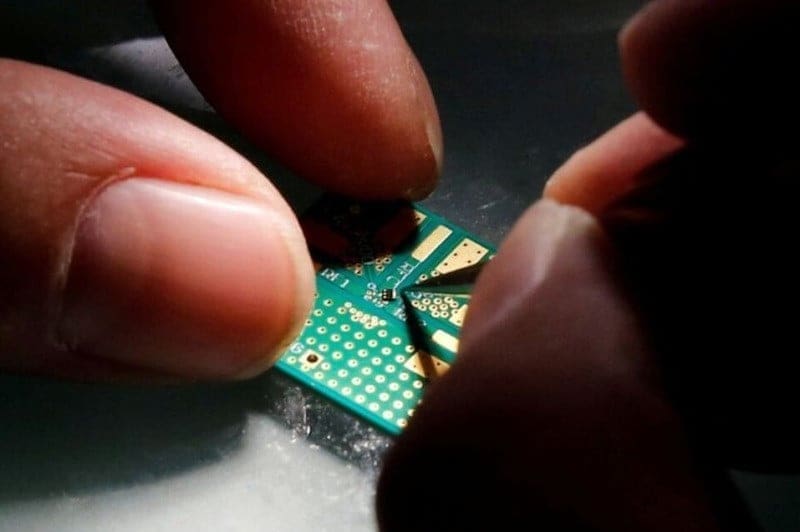The United States is taking action to stop American chipmakers from selling computer chips to China that go around government rules. This is part of what the Biden administration is doing to prevent exporting more AI (Artificial Intelligence) chips.

A researcher plants a semiconductor on an interface board during a research work to design and develop a semiconductor product at Tsinghua Unigroup research centre in Beijing, China, February 29, 2016. PHOTO: REUTERS
These new rules are being added to restrictions on sending advanced computer chips and chipmaking equipment to China. The details of these new rules are expected to be announced this week.
These rules will prevent specific AI chips from being sold to China, even if they almost meet the current technical standards. The companies making these chips must also report when they ship other chips to China. The US Department of Commerce oversees export controls and did not comment on this.
This move to restrict tech exports to China comes when the US tries to improve its relationship with China. Some members of the Biden administration have met with Chinese officials recently, and these new rules might make these efforts more difficult.

These export restrictions aim to keep American chips and equipment from being used by the Chinese military. China has accused the US of using export controls to harm Chinese companies. These restrictions significantly change how the US deals with technology exports to China.
The Chinese embassy in Washington has yet to comment on these new rules.
Last year, government restrictions prevented Nvidia, a leading chipmaker, from sending its most advanced AI chips to Chinese customers. These chips are commonly used to make chatbots and other AI systems. Nvidia then made less advanced chips for the Chinese market to overcome these restrictions.
The US plans to introduce new rules for AI chips that will restrict some advanced data centre AI chips that are not currently covered by the restrictions. The details of which chips will be restricted have yet to be revealed, but there are suggestions that Nvidia’s H800 chip might be one of them.
Nvidia, based in Santa Clara, California, has yet to comment on this. In June, the company’s chief financial officer said that if the H800 and a related chip called the A800 were restricted, it would have a minimal impact on their finances.
These new rules will not affect chips meant for everyday products like laptops. However, companies must tell the Commerce Department when shipping the most potent consumer chips to ensure they are not used in ways that could threaten national security.
To prevent potent AI chips from being sent to China, the US plans to change one of its parameters to restrict specific AI data centre chips. Changing this parameter will include more chips in the restrictions, which might reduce the speed at which AI chips communicate with each other.
The US will also introduce a “performance density” parameter to make it harder for companies to work around the rules. However, the details of this parameter still need to be clarified.
These updated rules are also meant to adapt to changes in technology. Companies must tell the government about chips below the guidelines before shipping them to China. The government will decide if these chips pose a national security risk on a case-by-case basis.
These updates might also close a loophole allowing Chinese companies to access American AI chips through Chinese units in other countries.
The new rules are not expected to restrict access to US cloud computing services or those of its allies. However, the US will seek feedback on the risks of this access and how to address them.
The Biden administration has informed Beijing of its plans to update these rules to stabilize relations between the two superpowers.

